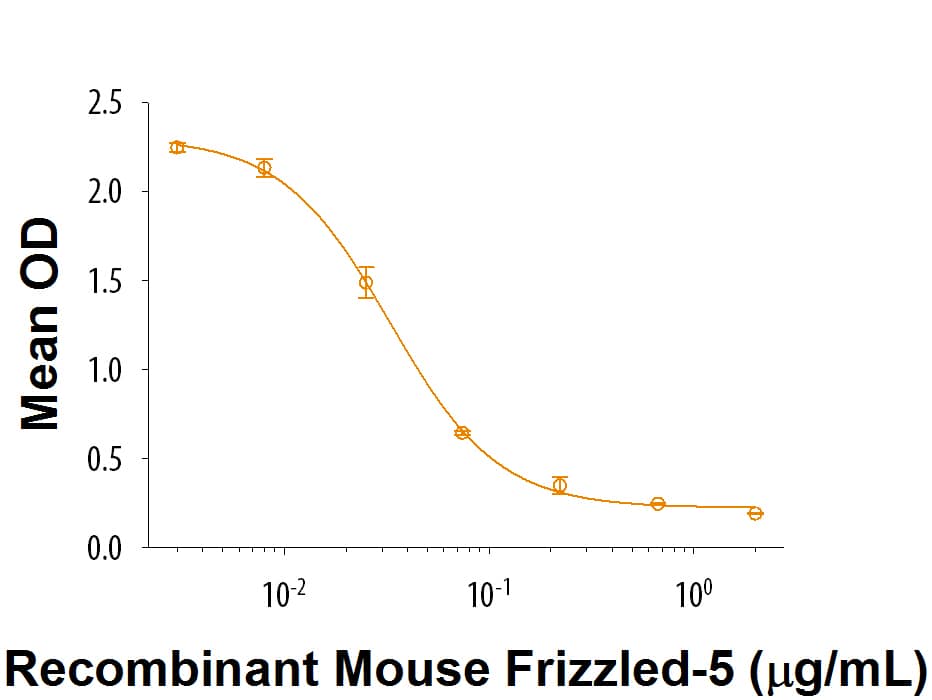Recombinant Mouse Frizzled-5 Fc Chimera Protein, CF
R&D Systems, part of Bio-Techne | Catalog # 9060-FZ

Key Product Details
Source
NS0
Accession #
Structure / Form
Disulfide-linked homodimer
Conjugate
Unconjugated
Applications
Bioactivity
Product Specifications
Source
Mouse myeloma cell line, NS0-derived mouse Frizzled-5 protein
| Mouse Frizzled-5 (Ala27-Pro167) Accession # Q9EQD0 |
IEGRMD | Mouse IgG2a (Glu98-Lys330) |
| N-terminus | C-terminus |
Purity
>95%, by SDS-PAGE visualized with Silver Staining and quantitative densitometry by Coomassie® Blue Staining.
Endotoxin Level
<0.10 EU per 1 μg of the protein by the LAL method.
N-terminal Sequence Analysis
Ala27
Predicted Molecular Mass
43 kDa
SDS-PAGE
54-64 kDa, reducing conditions
Activity
Measured by its ability to inhibit Wnt-3a-induced alkaline phosphatase production by MC3T3-E1 mouse preosteoblast cells.
The ED50 for this effect is 10-60 ng/ml in the presence of 5 ng/mL of Recombinant Mouse Wnt-3a (Catalog # 1324-WN).
The ED50 for this effect is 10-60 ng/ml in the presence of 5 ng/mL of Recombinant Mouse Wnt-3a (Catalog # 1324-WN).
Scientific Data Images for Recombinant Mouse Frizzled-5 Fc Chimera Protein, CF
Recombinant Mouse Frizzled-5 Fc Chimera Protein Bioactivity
Recombinant Mouse Frizzled-5 FC Chimera (Catalog # 9060-FZ) inhibits Recombinant Mouse Wnt-3a (Catalog # 1324-WN) induced alkaline phosphatase production in the MC3T3-E1 mouse preosteoblast cell line. The ED50 for this effect is 0.01-0.06 µg/ml.Formulation, Preparation and Storage
9060-FZ
| Formulation | Lyophilized from a 0.2 μm filtered solution in PBS. |
| Reconstitution |
Reconstitute at 500 μg/mL in PBS.
|
| Shipping | The product is shipped at ambient temperature. Upon receipt, store it immediately at the temperature recommended below. |
| Stability & Storage | Use a manual defrost freezer and avoid repeated freeze-thaw cycles.
|
Background: Frizzled-5
References
- Schulte, G. (2015) Eur. J. Pharmacol. 763:191.
- Saitoh T. et al. (2001) Int. J. Oncol. 19:105.
- Liu, C. et al. (2008) J. Neurosci. 28:5641.
- Katoh, Y. and M. Katoh (2007) Int. J. Oncol. 30:751.
- Ishikawa, T. et al. (2001) Development 128:25.
- Burns, C.J. et al. (2008) Dev. Dyn. 237:1614.
- Periera, C. et al. (2008) Arterioscler. Thromb. Vasc. Biol. 28:504.
- Blumenthal, A. et al. (2006) Blood 108:965.
- He, X. et al. (1997) Science 275:1652.
- Caricasole, A. et al. (2003) J. Biol. Chem 278:37024.
- Zhang, J. et al. (2008) Invest. Ophthalmol. Vis. Sci. 49:5561.
- Sahores, M. et al. (2010) Development 137:2215.
- Slater, P.G. et al. (2013) PLoS One 8:e78892.
Alternate Names
Frizzled5, Frz-5, FZ-5, FZD5
Gene Symbol
FZD5
UniProt
Additional Frizzled-5 Products
Product Documents for Recombinant Mouse Frizzled-5 Fc Chimera Protein, CF
Product Specific Notices for Recombinant Mouse Frizzled-5 Fc Chimera Protein, CF
For research use only
